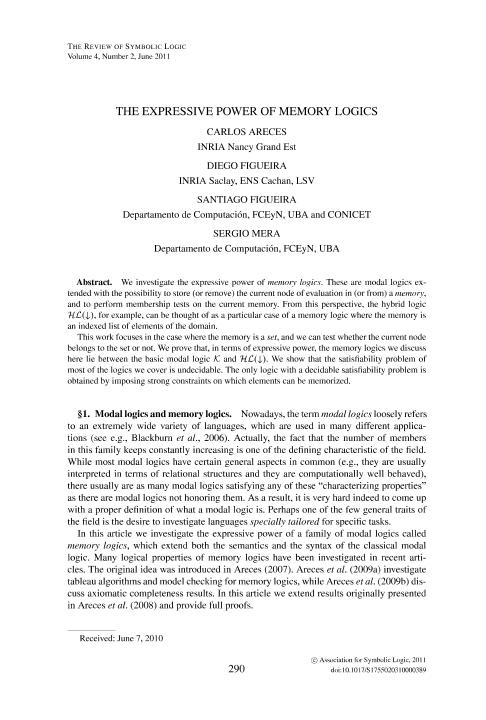Mostrar el registro sencillo del ítem
dc.contributor.author
Areces, Carlos Eduardo

dc.contributor.author
Figueira, Diego

dc.contributor.author
Figueira, Santiago

dc.contributor.author
Mera, Sergio Fernando

dc.date.available
2019-01-18T17:52:18Z
dc.date.issued
2011-06
dc.identifier.citation
Areces, Carlos Eduardo; Figueira, Diego; Figueira, Santiago; Mera, Sergio Fernando; The expressive power of memory logics; Cambridge University Press; Review of Symbolic Logic; 4; 2; 6-2011; 290-318
dc.identifier.issn
1755-0203
dc.identifier.uri
http://hdl.handle.net/11336/68257
dc.description.abstract
We investigate the expressive power of memory logics. These are modal logics extended with the possibility to store (or remove) the current node of evaluation in (or from) a memory, and to perform membership tests on the current memory. From this perspective, the hybrid logic ℋℒ(↓), for example, can be thought of as a particular case of a memory logic where the memory is an indexed list of elements of the domain. This work focuses in the case where the memory is a set, and we can test whether the current node belongs to the set or not. We prove that, in terms of expressive power, the memory logics we discuss here lie between the basic modal logic script K sign and ℋℒ(↓). We show that the satisfiability problem of most of the logics we cover is undecidable. The only logic with a decidable satisfiability problem is obtained by imposing strong constraints on which elements can be memorized.
dc.format
application/pdf
dc.language.iso
eng
dc.publisher
Cambridge University Press

dc.rights
info:eu-repo/semantics/openAccess
dc.rights.uri
https://creativecommons.org/licenses/by-nc-sa/2.5/ar/
dc.subject
Memory Logics
dc.subject
Expressive Power
dc.subject
Decidability
dc.subject
Model Theory
dc.subject.classification
Ciencias de la Computación

dc.subject.classification
Ciencias de la Computación e Información

dc.subject.classification
CIENCIAS NATURALES Y EXACTAS

dc.title
The expressive power of memory logics
dc.type
info:eu-repo/semantics/article
dc.type
info:ar-repo/semantics/artículo
dc.type
info:eu-repo/semantics/publishedVersion
dc.date.updated
2019-01-17T14:13:27Z
dc.journal.volume
4
dc.journal.number
2
dc.journal.pagination
290-318
dc.journal.pais
Reino Unido

dc.journal.ciudad
Cambridge
dc.description.fil
Fil: Areces, Carlos Eduardo. Institut National de Recherche en Informatique et en Automatique; Francia. Consejo Nacional de Investigaciones Científicas y Técnicas; Argentina
dc.description.fil
Fil: Figueira, Diego. Institut National de Recherche en Informatique et en Automatique; Francia. Consejo Nacional de Investigaciones Científicas y Técnicas; Argentina
dc.description.fil
Fil: Figueira, Santiago. Universidad de Buenos Aires. Facultad de Ciencias Exactas y Naturales. Departamento de Computación; Argentina. Consejo Nacional de Investigaciones Científicas y Técnicas; Argentina
dc.description.fil
Fil: Mera, Sergio Fernando. Universidad de Buenos Aires. Facultad de Ciencias Exactas y Naturales. Departamento de Computación; Argentina. Consejo Nacional de Investigaciones Científicas y Técnicas; Argentina
dc.journal.title
Review of Symbolic Logic

dc.relation.alternativeid
info:eu-repo/semantics/altIdentifier/doi/http://dx.doi.org/10.1017/S1755020310000389
dc.relation.alternativeid
info:eu-repo/semantics/altIdentifier/url/https://www.cambridge.org/core/journals/review-of-symbolic-logic/article/expressive-power-of-memory-logics/021B058177CA9738B490C1F373D12CA2
Archivos asociados
